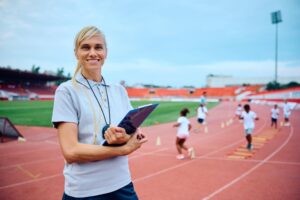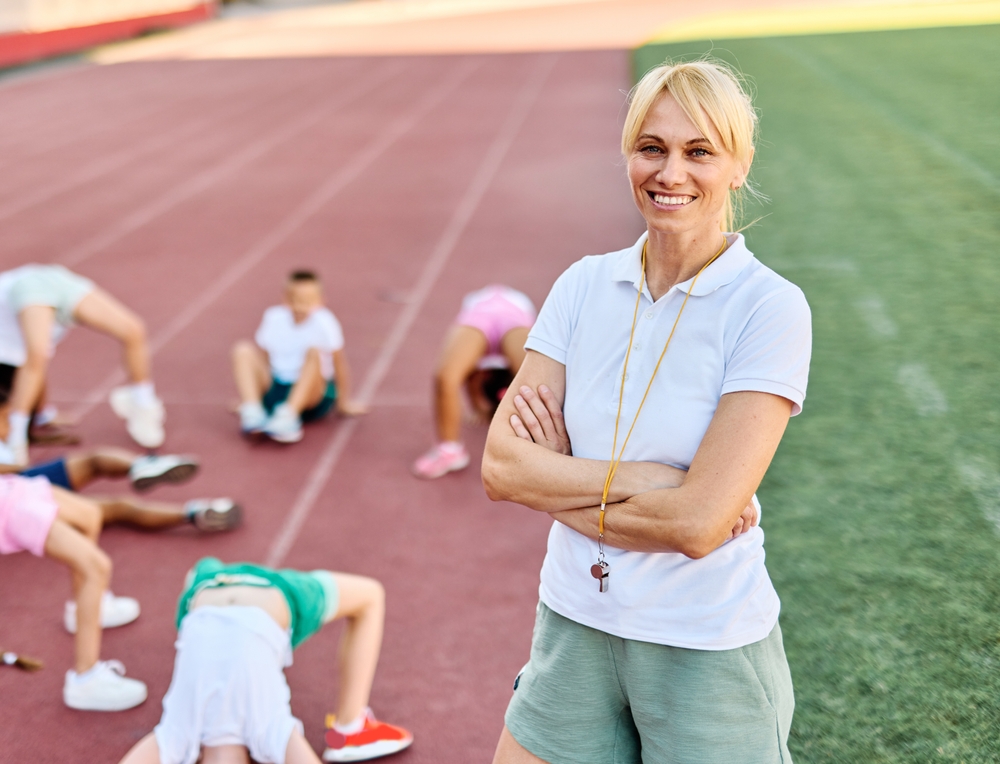Physical Education Jobs: Skills and Qualifications Needed
Introduction
Many sport-loving individuals, some of whom enjoy health and movement, are attracted to a career in physical education. It provides one the chance to guide the students in building healthy habits of fitness and self-esteem. However, just loving it is not a guarantee of success. You need certification. You need skills, the right mindset.
This guide contains all the information concerning jobs in physical education. It covers job titles, degrees one must attain, certificates that enhance one’s chances, attributes employers want, and tips on how to seek experience, stand out, and remain future-ready.

What Are Physical Education Jobs
Promotion of physical activity, health, and fitness is the hallmark of physical education jobs. The main preponderance of the human in the sunlight, consolidated in education, training, and coaching towards individuals or groups. They occur in sundry sites that include schools, colleges, gyms, sports clubs, and community centers.
Examples include:
- Teaching physical education in schools.
- Coaching school or college teams.
- Running community fitness programs.
- Leading adapted physical education for students with disabilities.
- Managing sports events and recreation programs.
Every role involves teaching movement, building discipline, and encouraging healthy lifestyles.
Why Choose a Career in Physical Education
Choosing this career means choosing a purpose. You help young people grow strong and active. and improve physical and mental health. You build teamwork and leadership in your students.
Other benefits include:
- Staying active while you work.
- Enjoying variety since every class is different.
- Working in schools, clubs, or even private training.
- Building relationships with students and athletes.
- Contributing to a healthier society.
If you value health, fitness, and education, this career fits well.
Types of Physical Education Jobs
You can pick from many paths depending on your interests.
- School PE Teacher
Teach sports, fitness, and health lessons. Create lesson plans. Assess students. - Sports Coach
Focus on one sport or team. Develop training sessions. Lead teams in competition. - Fitness Instructor / Personal Trainer
Guide fitness programs in gyms or studios. Design workout plans for individuals or groups. - Adaptive Physical Educator
Work with students who have disabilities. Modify activities to ensure inclusion. - Recreation Leader
Run camps, community fitness activities, and after-school programs. - Athletic Trainer
Help athletes with injury prevention, recovery, and conditioning. - University Lecturer in Sports Science
Teach advanced topics. Conduct research. Mentor future PE teachers. - Sports Program Coordinator
Such things are about the management of equipment, budgets, and scheduling-for sports programs in schools or clubs.
These are all different jobs, but their common goal is to make people healthy and strong.
Essential Qualifications
Employers want proof that you have studied and trained in physical education. Here are the most common requirements:
1. Bachelor’s Degree
Teaching or training roles in schools, colleges, or even private businesses bear the requirement of a minimum of a bachelor’s degree in any of the different physical education, kinesiology, exercise science, or sports science streams. The candidate is to study anatomy, physiology, nutrition, and pedagogy.
2. Teacher Training
If you teach in schools, the professional training required would include such elements as lesson planning, assessment methods, and classroom management. Most programs provide actual student teaching experience.
3. Master’s Degree (Optional but Valuable)
If your goal is advanced roles, instructing at universities, or working in leadership, a master’s degree advantages you.
4. Certifications and Licensing
A license to teach is a requirement in a lot of states and countries. It usually entails passing an exam, undergoing a background check, and the requirement to continue with education. A fitness instructor may have to seek certification from a credible organization.
5. Safety Training
Being certified in first aid and CPR is quite important. Employers will want to be sure that you are able to handle an emergency in a sports or activity setting.
6. Adapted Physical Education Knowledge
You’ll need specialized training in adapted PE methods if you want to work with disabled students.
7. Strong Subject Knowledge
You must know the sport and human biology, biomechanics, and nutrition. It will be when you can teach the safe way for your athletes.
Key Skills You Must Have
Your degree proves your knowledge. Your skills prove your value. Employers look for these skills:
- Communication – Giving clear instructions is a must. You explain each technique simply in a manner that the students can understand.
- Leadership – You manage the classes and the teams confidently.
- Motivation – You keep motivating the students who sometimes resist activity.
- Creativity – You design exciting and interesting activities.
- Patience – You go an extra step to support learners across different skill levels.
- Adaptability – Considerations must be made to adjust plans in regard to limits of space, weather conditions, or availability of resources.
- Fitness – Healthy behaviors should be modeled, and exercising would demonstrate a variety of possible exercises.
- Organization – The lessons, equipment, and schedules have to be organized.
- Teamwork – Work with other teachers, parents, and coaches.
- Risk Management – Safety should be ensured within the class, and wherever possible, risks should be reduced.
Personal Traits That Matter
Your personality can make you stand out. These traits matter as much as your degree:
- Passion for fitness- You have to show that you believe in the essence of physical activity.
- Enthusiasm- The students respond to your energy.
- Resilience- Some days are always hard, so you need to remain strong.
- Integrity- Treat students fairly and with respect.
- Confidence- Hold classes with firmness and positivity.
- Cultural Awareness- Respect diversity and adapt your teaching styles.
How to Gain Experience
Employers want experience, even for entry-level jobs. Here’s how you can build it:
- Volunteer at schools or camps.
- Assist sports coaches.
- Work as a fitness assistant in a gym.
- Run after-school sports clubs.
- Join internships during your studies.
- Help organize tournaments or recreation events.
Each opportunity improves your resume and builds real teaching ability.
Certifications & Licensing
Here are common certifications you may need or want:
- Teaching license from your state or education board.
- CPR and First Aid certification.
- Personal trainer or group fitness certification.
- Adapted Physical Education endorsement.
- Specialty certifications in yoga, strength training, or conditioning.
Keep them updated. Renew on time. Show employers that you stay current.
Trends and Future of Physical Education Jobs
The field is changing. You must know the new directions.
- Schools now focus on overall wellness – including mental health.
- Technology enters PE. Fitness apps and trackers are common.
- Nature-based adaptive programs did undergo expansion in the philosophy of inclusive education.
- Yoga, mindfulness, and dance are some of the new activities gaining popularity out there.
- Public health concerns such as obesity–one of them!–increase demand for the best quality teachers of physical education.
Being aware of trends helps you stay relevant and employable.
Challenges You Will Face
No career is free of challenges. Here are common ones:
- Limited budgets for equipment.
- Large classes with diverse needs.
- Lack of support from administrators at times.
- Weather and space restrictions.
- Students with low motivation.
- Balancing fun and discipline.
- Handling paperwork and reports.
How to Stand Out in Job Applications
Competition can be tough. To stand out:
- Write a strong resume that highlights teaching and coaching experience.
- Gather references from mentors or coaches.
- Build a portfolio with lesson plans, activity designs, and student feedback.
- Show unique skills such as tech use, multilingual ability, or adaptive PE.
- Engage continuously with professional learning through workshops or courses.
- Speak from a genuine passion at an interview and share real stories of impact.
Conclusion
Physical education jobs are rewarding and important. They need more than love for sports. Some strong qualifications have got to be there. Key skills must be mastered. One has to show a lot of eagerness and integrity. Experience is a must, in addition to remaining in tune with the forces and trends.
This is when they say professionalism hovers around those elements. You develop a career that really touches students, athletes, and communities. That is, in a way, nudging people toward better and stronger lives. That is the true meaning of career success in physical education.




